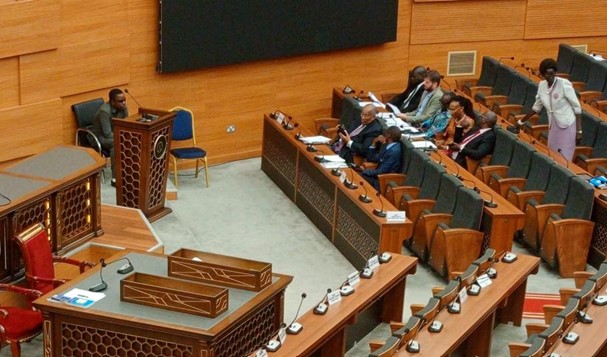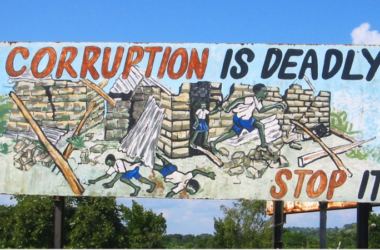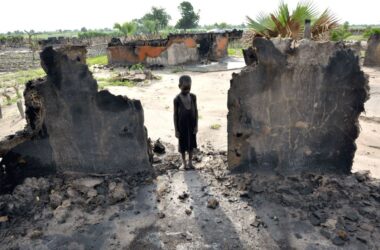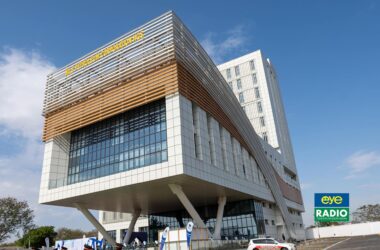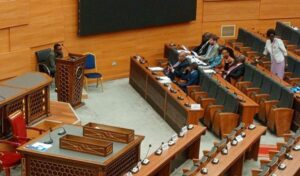
By Alan Clement
Members of the Transitional National Legislative Assembly (TNLA) have voiced deep concerns over security and election preparedness, following deliberations on the latest R-JMEC report covering July to December 2024.
The report deliberated during the 14th ordinary TNLA sitting on Tuesday noted stalled progress in the Phase II training and deployment of the Necessary Unified Forces (NUF), persistent funding shortages for security mechanisms, and limited progress by electoral institutions ahead of the December 2026 elections.
Regina Nyakouth an MP representing Jonglei State cautioned that funding gaps affecting electoral institutions. “The challenges of funding are very, very clear in the report. And therefore, it’s very important that we look at this.”
She also said emergence of militarized holdout groups pose a direct threat to peace and democratic transition.
“I was a member of that team of negotiators of the Tumaini initiative and after negotiations, the holdout group came out with a new structure, military in nature. They called themselves the United People’s Alliance. The statement they gave that there’s going to be intensified struggle using all means possible is a not good for peace,” she told the lawmakers while urging government to address humanitarian and security challenges before proceeding with elections.
Unity State MP Samson Machok dismissed the report as outdated, claiming “the security agreement is no longer holding,” and warning that “parties to the peace agreement are actively fighting, undermining the peace process.”
Bol Toby Maduot of Warrap called for elections to go ahead on schedule, citing “public demand,” but warned that unresolved constitution-making, census, and security arrangements could derail the polls. He pressed the Minister of Cabinet Affairs to clarify whether there are contingency measures in case the planned steps fail.
Taban Luka Guya of the National Agenda party emphasized the urgent need to allocate resources exclusively toward the 2026 elections, warning that without designated funding, the process cannot proceed.
“We should not fund any activity; only we fund activities connected to the elections,” he recommended.
Addressing the stalled implementation of Chapter II of the peace agreement, Taban Luka Guya cautioned that without unified forces and secured conditions, the December 2026 elections would be untenable.
“If we are going for elections, without Chapter Two, are we going to campaign or even vote?” he asked
He urged Parliament and relevant ministries to provide clear guidance and operational support, stressing that the unification of forces and constitutional clarity are prerequisites for credible elections.
In response, Martin Elia Lomuro, the Minister of Cabinet Affairs, emphasized that the National Electoral Commission, Political Parties Council, and National Constitution Review Commission are operational and prepared. However, he acknowledged that budgetary constraints remain a critical bottleneck.
“All the electoral-related institutions have their plans ready, and they will finish their job well before the time for the election, if they are given the budget,” said Lomuro.
He confirmed that Phase I of the unified forces deployment is complete, with army and national security personnel already in place. However, Phase II, which includes police, prison services, and wildlife forces, is stalled due to a lack of funding. He assured Parliament that the training centers are ready, the force structure is defined, and logistics are in advanced stages, with plans to begin implementation this month pending budget approval.
“Phase two, Chapter Two, we already finished phase one. We’re only left with police, prison, and wildlife, because we don’t have a budget for their salaries.”
The Minister of Peacebuilding, Stephen Par Kuol, defended the peace process as “still on track despite challenges,” announcing that a work plan for Chapters I and II would soon be presented to the Council of Ministers.
R-JMEC reaffirmed its role in monitoring and reporting, stressing its mandate to submit findings to the government and the UN, and calling for renewed cooperation to keep the peace process alive.

